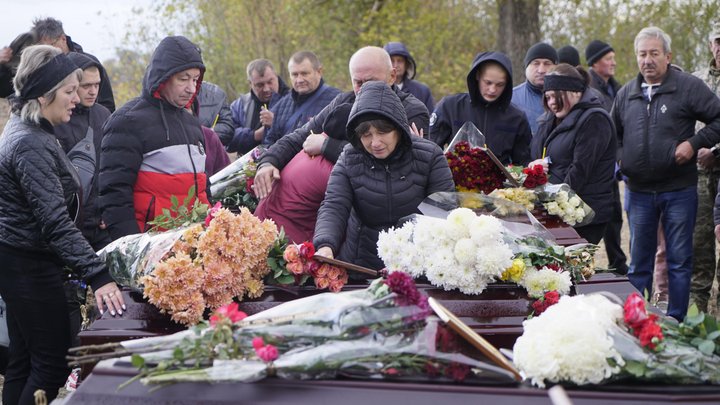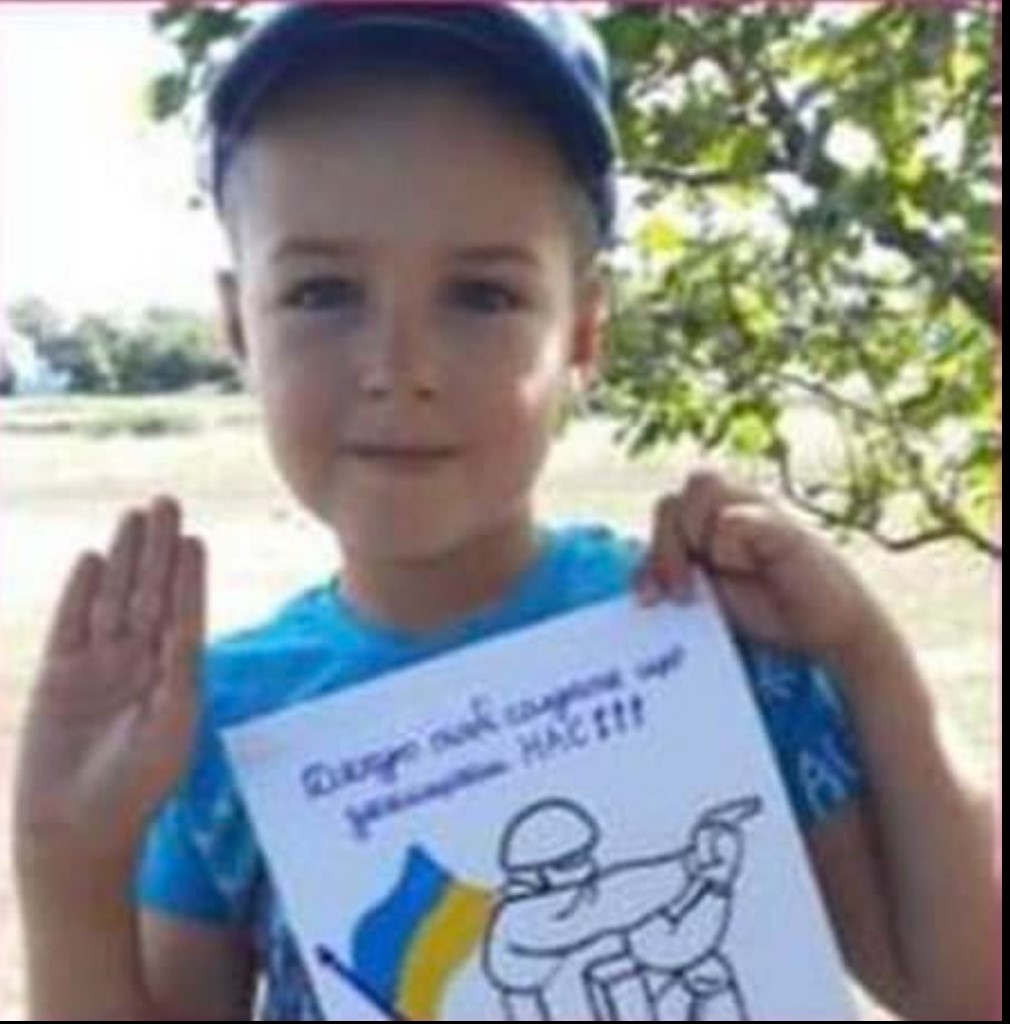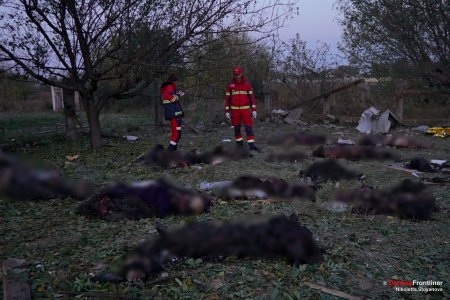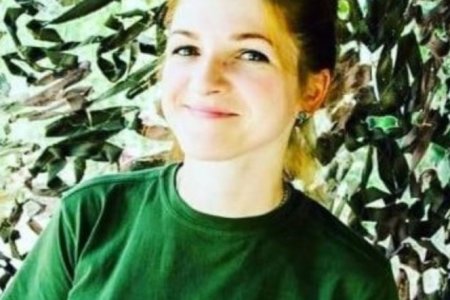
Vasily Nebenzya Russia’s permanent representative at the UN, has confirmed that Russia carried out a missile strike that killed at least 53 residents of the small Kharkiv oblast village of Hroza on 5 October 2023. By trying to claim that the missile strike was justified, the Russian effectively acknowledged that the café – shop, in which a funeral wake was underway, had been deliberately targeted.
The attack had aroused international outrage and the UN’s High Commissioner for Human Rights announced immediately that it would be sending a team of investigators. With Russia claiming as ever that it only ever strikes military targets, Nebenzya clearly had a lot of lying to do when the attack was discussed at the General Assembly. He did so, presenting two different lines of argument that contradicted one another.
The first, which the Russian state-controlled TASS press agency picked up on for its title, was to present the Russian missile attack on around 60 mourners as suspiciously ‘convenient’ for Kyiv and Ukraine’s President Volodymyr Zelensky.
“The tragedy in the village of Hroza, which is the reason for today’s meeting, took place just at the moment when Zelensky was trying to convince the EU of the need to continue its support for the Kyiv regime at the EU summit in Spain. Ukrainians themselves are saying that they should not only be frightened of Ukrainian air-defence rockets, but of Zelensky’s foreign visitors and visits.”
However deranged Nebenzya’s words above may sound, they were undoubtedly all prepared in advance, right down to the cynical mention of Ukraine’s air defence rockets, which Russia has previously tried to claim were responsible for its own missile attacks on civilians. Hroza, which is fairly close to Ukraine’s eastern border with Russia, is a small village, with only one building (until Russia’s missile strike) that was big enough to hold a funeral wake attended by over half of the village’s residents. Even before Russia’s full-scale invasion, the population was just over 300. After the months of Russian occupation in 2022, this had fallen to around 100. Any attempt to suggest that the Russian Iskander missile that hit the café was knocked down by a Ukrainian anti-aircraft rocket is insultingly absurd.
So too, however, are attempts to claim “a magic coincidence” in such attacks, purportedly, taking place when Zelensky is visiting or hosting foreign guests. It is Russia that carried out this attack, as it has numerous other bloody missile strikes on clear civilian targets.
Nebenzya even goes on to admit this, while trying to claim that the funeral wake was a legitimate target. He falsely asserts that Andriy Kozyr, whom the funeral wake was honouring, had been “one of the high-ranking Ukrainian nationalists” and that the ceremony had been attended by his military colleagues, whom Nebenzya calls ‘neo-Nazis’. He asserts that “it is no accident that on the photos posted on social media immediately after the attack, almost all the bodies were of men of call-up age”. This is especially offensive given the direct missile strike which left many of the bodies totally unrecognizable, and needing to be identified by DNA. He claims, without citing a single verifiable example, that immediately after Kyiv protests over Russia’s other attacks on civilian targets, you see a huge number of death notices “of military personnel and foreign mercenaries”. He suggests that the same may happen after 5 October in Hroza, and accuses Kyiv of concentrating many military personnel, heavy military technology or air-defence systems in residential areas.
Nebenzya has, thus, admitted that the missile strike was deliberate, while also claiming that such ‘magic coincidences’ are somehow orchestrated by Kyiv. The calculation is, presumably, that few will note such contradictions amid the torrent of words, and that the message left will be that, somehow, Ukraine was to blame. For Russia’s domestic audience who believe sources like TASS, the calculation may be accurate. There are probably more cynical motives for why 83 countries voted on 10 October to allow Russia back on to the UN Human Rights Committee. Russia’s attempt to get reinstated, after being thrown out over its full-scale invasion of Ukraine, did, thankfully, fail, but a significant number of countries were still prepared to support it.
Nebenzya brazenly lied about the victims of Russia’s missile attack on Hroza, as well as about the Ukrainian defender whose reburial in his home village was the reason for the funeral wake.

Andriy Kozyr was 49 when Russia began its full-scale invasion of Ukraine. He and his son, Denis, were working in Poland, but returned to Ukraine on 24 February 2022 and signed up to defend their country. He was not a ‘high-ranking military officer’ and Russia’s use of the terms ‘Ukrainian nationalist’ and ‘neo-Nazi’ are based solely on the fact that a Ukrainian returned to defend his country when it came under Russian attack.
Andriy Kozyr was killed in March of that year near Popasna (Luhansk oblast). His son, who had been serving with him, had his father buried in the Dnipropetrovsk oblast, as Hroza was then under Russian occupation. After the Russians were driven out of Kharkiv oblast, Denis Kozyr resigned from active service for health reasons and, by October 2023, decided to rebury his father at home, in Hroza.
A Graty correspondent visited Hroza shortly after the attack and learned that around 60 people had been attending the funeral wake. The civilians whom Russia murdered that day were all from Hroza. 53 people, including one child, are presently known to have died, however that number will almost certainly rise as several people remain unaccounted for. The Russian missile strike directly hit the building.
The victims included:
20 members of Andriy Kozyr’s family: his wife Alina Kozyr (44), his 24-year-old son, Denis Kozyr and daughter Liza (Yelizaveta) Kozyr (22). Alina and Liza had been working in Poland, and had arrived in Hroza the day before, in order to attend the reburial;
Alina Kozyr’s parents Mykola Hryb (66) and Hina Hryb (64);
Denis’ wife, Nina Kozyr, who should have been turning 21 on 14 October, and was studying at a Kharkiv pedagogical institute, and her mother, Liudmyla Chehodaieva;
8-year-old Ivan Kozyr and his father Ihor Kozyr, who was 36 and a cousin; Ivan’s aunt Olha Pashchenko-Kozyr and grandfather, Anatoliy Kozyr (69);
25-year-old Maksym Sirokurov, a distant nephew, and his wife, Alina Sirokurova (23). The couple had two very small sons (aged 2 and 4), and both were working, and had no military connection;
Maksym’s grandparents Halyna Hryb (65) and Ivan Hryb (68);
Eva Yaremenko, who was 70 and the sister of Andriy Kozyr’s father-in-law;
Eva’s children; Halyna Malikova (35) and Ivan Yaremenko (34)
Svitlana Platonenko (45) and her father, Oleksandr Hlushko (69)
Others present at the wake, or in the shop when the Russian missile hit
Tetiana Androsovych, a 60-year-old pensioner;
her husband Mykola Androsovych, who was 63 and working for the ‘Aqua’ commercial enterprise;
Yulia Bardas, who was 36 and the mother of two sons, aged 10 and 13;
her mother, Raya Bardas, who was 72;
Vitaliy Bilous who was 44 and a friend of Andriy Kozyr;
Viktor Chepil (69);
Liubov Chepil (61)
Hanna Chykalo, who was 61 and an accountant;
Volodymyr Dolhanin, who was 53 and worked as a machine driver at a gas production plant
Angelika Herasymenko, 47;
Iryna Kharbaka (57);
Tetiana Kharbaka (53);
Oleksandr Khodak (70);
Valentina Korkh, who was 55 and a nurse;
Liubov Kotenko (50)
Hryhoriy Kovalenko (59)
Olena Krysevych, 60, a retired teacher;
Volodymyr Mukhovaty, who was 47 and a physics and IT teacher;
his wife, Svitlana Mukhovata (43);
and mother Tetiana Mukhovata;
Oleksandr Nechvolod, 60 and the head (starosta) of the Petropil Hromada;
Anatoliy Pantielieiev;
his wife Olha Pantielieieva;
his parents Iryna Pantielieieva and Valeriy Pantielieiev
Olha Pilhuy, 48;
Oleksandr Ponomaryov (70) and his wife, Natalia Mamon (58);
Oleksandr Pyrozhok (65);
Tetiana Pyrozhok (62);
Viktoria Sapach, who was 47 and a nurse
Oleh Sapach
Tamara Solianyk, who was 61 and a maths teacher;
Oleksandra Odehova (74) whose body has not yet been identified
Valentyna Fomenko (70) and also not yet identified
Zoya Nechepurenko, who was 58 and had simply gone to the shop, next to where the wake was taking place, to get some bread.
Moscow continued its attacks on civilian targets. On 6 October, yet another strike in Kharkiv killed a 10-year-old boy and his grandmother.



